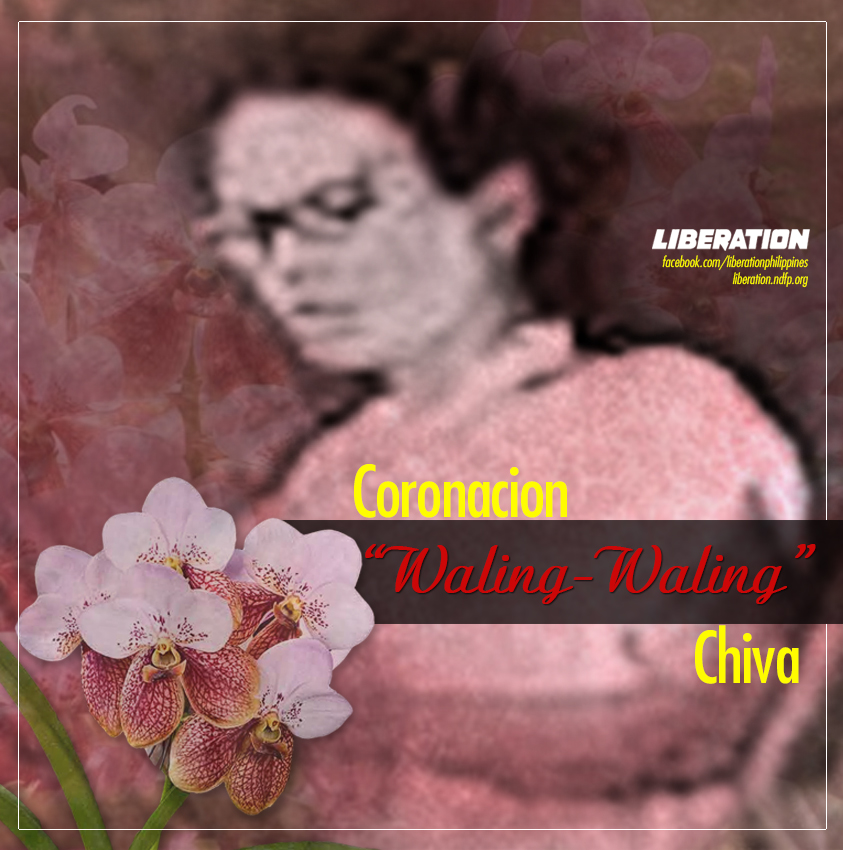Waling-waling is a beautiful orchid that blooms in the deep recesses of the forests of Panay contending for sunlight with intertwining vines and branches. In analogy, the Coronacion “Waling-waling” Chiva Regional Command of the New People’s Army in Panay continues its struggle amid class contradiction for liberation from the oppressive semi-feudal semi-colonial social order.
The Command was named after a woman, whose husband’s recognition of her valor and tenacity accorded her the nom de guerre Waling-waling.
 Coronacion “Waling-waling” Chiva and her husband, Andres Togonon or Amang Ali, were members of the old Communist Party of the Philippines (CPP) and the Hukbong Mapagpalaya ng Bayan (HMB) in Panay, which waged an armed struggle against the Japanese invaders and later against the ruling US-puppet government. Andres was the political officer of the HMB while Corning became a commander of an HMB unit. They gallantly fought the armed forces of the reactionary government until the incorrect political line and adventurist stance of the Lava leadership, in its frantic dash for power, permeated the HMB in Panay causing its decline and eventual collapse. Commander Waling-waling led the platoon that made the last stand against the enemy in Nalbugan, Bingawan, Iloilo. Eighteen of them were surrounded by 80 soldiers of the Expeditionary Force of the Philippine Army. Waling-waling’s will to fight to the end was doused by the sight of her men who were skeptical of the wisdom to continue the fight. She reluctantly ordered to put down their arms. For the first time in her guerrilla life, she cried. It was difficult to accept that the armed struggle of the HMB and the Party in Panay had ended.
Coronacion “Waling-waling” Chiva and her husband, Andres Togonon or Amang Ali, were members of the old Communist Party of the Philippines (CPP) and the Hukbong Mapagpalaya ng Bayan (HMB) in Panay, which waged an armed struggle against the Japanese invaders and later against the ruling US-puppet government. Andres was the political officer of the HMB while Corning became a commander of an HMB unit. They gallantly fought the armed forces of the reactionary government until the incorrect political line and adventurist stance of the Lava leadership, in its frantic dash for power, permeated the HMB in Panay causing its decline and eventual collapse. Commander Waling-waling led the platoon that made the last stand against the enemy in Nalbugan, Bingawan, Iloilo. Eighteen of them were surrounded by 80 soldiers of the Expeditionary Force of the Philippine Army. Waling-waling’s will to fight to the end was doused by the sight of her men who were skeptical of the wisdom to continue the fight. She reluctantly ordered to put down their arms. For the first time in her guerrilla life, she cried. It was difficult to accept that the armed struggle of the HMB and the Party in Panay had ended.
Corning was arrested and joined her husband, Andres, in detention. Andres was earlier on arrested while teaching cadres and commanders of the old CPP and HMB at the Stalin University in the forested area of Taroytoy, Libacao, Aklan. Andres was among the five survivors of the Toroytoy massacre that took the lives of 36 leading HMB members. In collusion with Pablo Hipana, one of the students, the Battalion Combat Team of the enemy managed to encircle and attack the school.
Upon release from prison, Andres and Corning continued to organize workers in Davao. When they returned to Barangay Alibunan, Calinog in Panay, the national democratic revolution with a correct political line has advanced. A team of the New People’s Army (NPA) was deployed in Panay in 1971. The team, which got in touch with Corning and Andres, received a warm and cordial welcome. The resurgence of the revolution in Panay was a dream come-true for the couple. For despite the dismantling of the HMB, the revolutionary fire in their hearts was never extinguished and the hope and the will to see the struggling masses and the country free from oppression and exploitation never dwindled.
Corning, like a mother to her children on their first stride, guided the team. She was a leader who never lost the mien of Commander Waling-waling whose every command was firm, respected and obeyed. She helped the team take roots in Jalaud in Calinog, Tapaz and Libacao. She linked them to the families of former colleagues in the defunct HMB. The couple also let their eldest son, Dax, join the NPA. He was matyred in 1975. Despite the ferocity of Martial Law, Corning’s family relentlessly assisted the NPA.
Corning was an inspiration to the young batch of revolutionaries. When one of the ladies in the team was contemplating on a name to use in battle, Corning suggested her nom de guerre–Waling-waling. Humbled the young lady declined as she believed there was only one Waling-waling, there could never be any other. But like a true communist, who never rested on her laurels and who believed that the young generations should carry the torch of the continuing revolution, Corning insisted. Thus, the young warrior came to be known as her Junior.
Commander Waling-waling was killed in August 1977 by a military agent under the Central Command of the AFP in Cebu. Upon her death her husband, Andres, despite his advance age, joined the NPA. Together with his whole family, he continued the fight against the US-Marcos dictatorship.
In honor and memory of Coronacion “Waling-waling” Chiva, the Panay Regional Command was named after her. Her valuable contribution to the revolution – the best years of her life spent in the service to the revolutionary movement and the efforts to link the patriotic revolutionaries of the past to the new generation of revolutionaries – will remain an undying memento not just to look back to but to propel the continuing advance of the people’s revolution until the unjust social structures are put to rest.#

